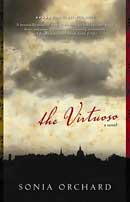
Brilliant Australian pianist Noël Mewton-Wood is these days only remembered by musicians of a certain age. In his prime Mewton-Wood was internationally feted and his immediate circle included such luminaries as Benjamin Britten and Michael Tippett. Mewton-Wood is the central character in this fictional story of love and music.
When World War II began, a group of London musicians decided to hold free lunch hour concerts at the National Gallery. The concerts continued throughout the war although bombing necessitated a few changes of venue. During these performances the unnamed narrator is awestruck by the virtuosity of Noël and develops a fascination with his gift. "Forte octaves, both hands, three times up the keyboard, arriving at the theme, those big, dark chords producing an orchestra of sound. Then the most pleading, yearning song. I'd never heard anything so beautiful...".
The narrator is a student pianist and he inevitably meets his idol. After a brief sexual relationship he continues to see himself as Mewton-Wood's one true love. Over several years the two men meet intermittently at parties and recitals and the reader constantly wonders whether they will be reunited.
When the narrator first meets Mewton-Wood the virtuoso is playing Schumann's Fantasie Op.17, described by the narrator's father as "a love letter written in musical notes." This is one of many pieces which the composer wrote for his wife Clara Wieck. As the novel progresses the narrator draws a parallel between the Schumanns' relationship and that of Mewton-Wood and himself. Mewton-Wood is Schumann and he is Clara. "None of us considered it as anything more than a supernatural gift that had landed in his lap, some astounding ability that he possessed – to be able to walk on the stage and into the shoes of Schumann."
The narrator is obsessed with the notion of lovers torn apart, as the Schumanns initially were. Later he comes to see the musical personalities of Schumann — Florestan (the extrovert) and Eusebius (the introvert) — as analogous to the two sides of Mewton-Wood.
Aficionados will find the musical references interesting and evocative, while the musically uninitiated will find an enthralling story. Orchard immerses the reader in the world of the musician: practice, recitals, sessions of listening to recordings, and discussions with friends. And even though the characters are a stupendously talented group the reader discovers that they are also simply human.
This is an excellent debut novel. Orchard's seemingly effortless
prose flows beautifully across each page of this rich and moving book.

Fourth Estate (AUS), paperback, 9780732288075